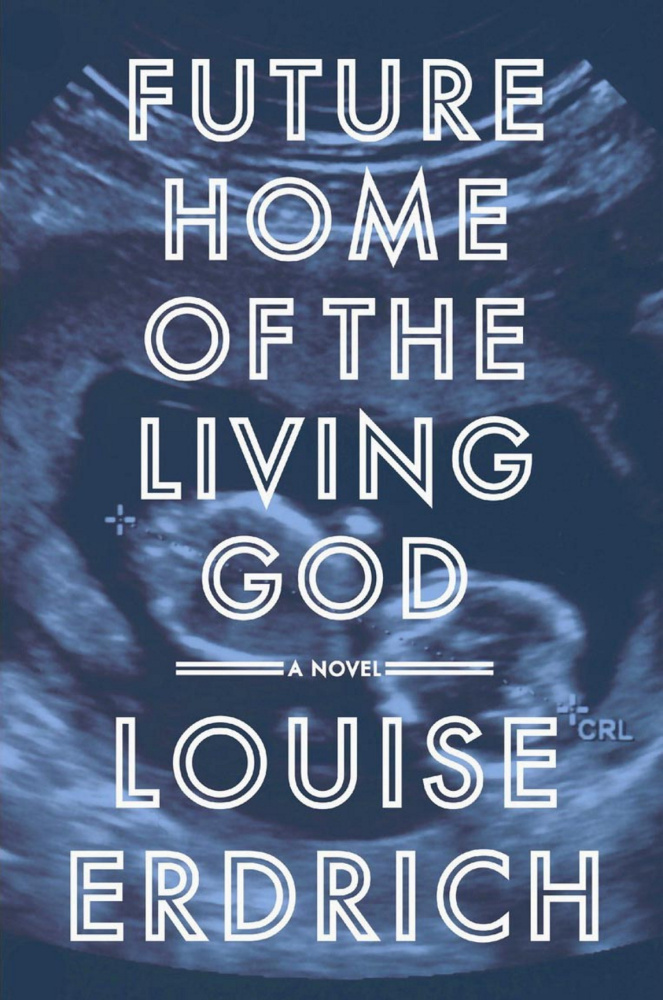Forget Yeats’s rough beast, slouching toward Bethlehem. In “Future Home of the Living God,” novelist Louise Erdrich’s dystopian parable of the way we live now, civilization and all its creatures are careening backward, even as the world ostensibly crawls forward.
In the future chronicled by Cedar Hawk Songmaker, a pregnant Native American writing a journal that her unborn child may never read, evolution has reversed course. Infants are losing the power of speech. Plants and animals increasingly resemble long-extinct fossils. Weird birds take flight, alongside dragonflies with 3-foot wingspans and softball-sized eyes.
“Our bodies have always remembered who we were,” muses Cedar. “And now they have decided to return. We’re climbing back down the swimming-pool ladder into the primordial soup.”
That’s bad news for pregnant women, rounded up by UPS – the Unborn Protection Society – on behalf of a shadowy theocracy calling itself the Church of the New Constitution.
The apparent goal: Preserve those increasingly rare offspring who somehow haven’t descended the evolutionary chain, while using childbearing women as breeders housing previously frozen embryos.
It all suggests Margaret Atwood’s “The Handmaid’s Tale”; as Erdrich writes in a note to her readers, it relates to a here and now of “white men in dark suits deciding crucial issues of women’s health.”
At its best, it also plays a variation on Erdrich’s great theme, experienced by so many of the Native American characters she’s created during her career: Versions of the original sin through which invaders ruined indigenous cultures, murdering native peoples and stealing their land.
This novel’s theocracy is yet another illustration of killers invoking God to destroy paradise.
Hence the late swerve – in a novel where we’ve spent much of our page-turning, heart-thumping time rooting for Cedar to remain free – to fantasies of native peoples taking back their land while governments around them disintegrate.
It’s a theme Erdrich introduces and then doesn’t pursue, in a novel that’s stuffed with intriguing ideas but uneven in advancing them and often unsure where to go next (or how to end).
There’s another narrative strand involving Cedar’s liberation-theology Catholicism; Erdrich frequently introduces Catholic tropes and themes in her work, although they’re usually more developed and integrated.
We’re also given an insightful portrait of a marriage, suggesting that the best-intentioned and most feminist of men will lose their way in a patriarchy that erodes relationships and trust while destroying equality.
Best of all, we’re treated to a puckishly comic culture clash before the world goes fully wrong; Erdrich playfully skewers the white and crunchy Minnesota liberals who raise Cedar, while turning an equally satirical eye on her native family up north.
These Ojibwe relatives include a gothic teen sister; a wise, tale-telling grandmother; a once-wild biological mother raising money for a saint’s shrine; and a smart and quirky stepfather working on a 3,000-plus-page manuscript, in which every page features an argument for not killing oneself.
This native family does an admirable job of standing up as the world falls down; I’d have gladly spent more time getting to know any of them, along with Cedar’s adoptive mother or the father of Cedar’s child.
But they all largely remain a mystery, in a novel where the plotting isn’t sure and where it’s never entirely clear why and how so much goes wrong so quickly.
What’s both clear and inspiring is Cedar’s own abiding belief in a future; having long ago had an abortion and tempted early on to end the life she now carries, she chooses instead to carry on, convinced that “we have survived because we love beauty and because we find each other beautiful.”
Beauty’s promise, Cedar decides, is worth the risk of capture and death.
The world may be going to hell; as Cedar’s adopted mother tells her, we may already be living in hell. But as Erdrich has eloquently suggested so many times, that’s all the more reason to choose life.
Send questions/comments to the editors.



Success. Please wait for the page to reload. If the page does not reload within 5 seconds, please refresh the page.
Enter your email and password to access comments.
Hi, to comment on stories you must . This profile is in addition to your subscription and website login.
Already have a commenting profile? .
Invalid username/password.
Please check your email to confirm and complete your registration.
Only subscribers are eligible to post comments. Please subscribe or login first for digital access. Here’s why.
Use the form below to reset your password. When you've submitted your account email, we will send an email with a reset code.